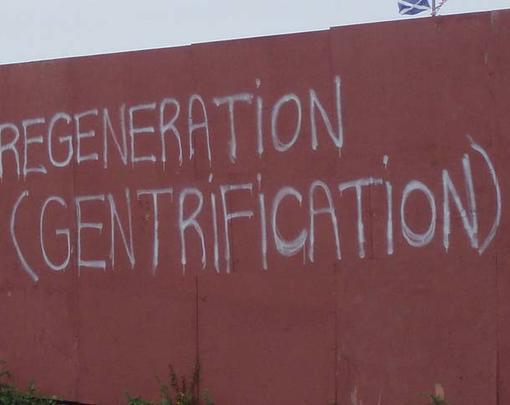This past year, state and municipal lawmakers teamed up with community organizations to fight for—and win—a wide variety of policies and initiatives that will help foster a more democratic economy.
New measures supporting public banking, worker co-ops, and community land trusts were launched across the country, continuing to grow a robust, cooperative economic ecosystem that builds community wealth. Here, we’ve highlighted some of the most exciting changes in local and state policy that happened in 2019.
Public banks
Public banks, unlike their private counterparts beholden to the profit demands of Wall Street shareholders, are owned by and accountable to the public. This year saw some important victories in the movement for these democratic financial institutions.
In October, California Governor Gavin Newsom signed State Assembly Bill 857 into law, making it easier for California municipalities and regions to establish their own public banks. The bill was supported by a diverse coalition of California groups, among them unions, political parties, and community and environmental groups. These democratically owned and controlled financial institutions will be under the same regulatory supervision as private banks, yet can have a radically different purpose: to address the needs of local communities instead of enriching private shareholders. Public banks promise to serve the people most marginalized by private financial institutions, which have busied themselves alternating between excluding and predating upon communities of color.
Just a few weeks later, New Jersey Governor Phil Murphy took the first steps needed to start a state-owned public bank, signing an executive order establishing a 14-person implementation board. The board will have one year to develop the public bank’s business plan to reflect communities’ capital needs, and outline a governance and operation structure. “A public bank would expand access to capital that is needed to address New Jersey’s most pressing and unmet needs in our state’s most under-served communities,” said Phyllis Salowe-Kaye, executive director of New Jersey Citizen Action and one of the four public members of the implementation board. “There are many socially beneficial projects that don’t have adequate funding, including upgrades to public infrastructure, expanding affordable housing and neighborhood revitalization, reducing student loan debt, and providing micro-loans for small businesses.”
These victories for democratically-controlled finance in New Jersey and California are not anomalous, but rather signal a nationwide distrust of private financial institutions and the first, concrete steps towards creating systemic alternatives. Although attempts to pass public banking laws in four other state legislatures—in New York, New Mexico, New Hampshire, and Massachusetts—failed, we are seeing the beginning, not the end, of these state and municipal efforts.
After all, the promise of public banks is too potent to be shuttered by a few early legislative defeats. Public banks can be instrumental in extending credit and banking services to communities and other local financial institutions when private banks won’t. As The Democracy Collaborative’s own Carla Santos Skandier has argued, public banks can also be established to finance a Green New Deal and a just energy transition away from fossil fuels.
In addition to serving the principles of economic, racial, and environmental justice, public banks can be used to finance business models—particularly worker co-ops—that have long faced regulatory hurdles and prohibitive lending practices.
Worker ownership
Worker ownership is having a bit of a moment. In the run-up to the 2020 presidential election, we witnessed Democratic primary frontrunner Bernie Sanders make worker ownership a key component of his campaign platform. On the ground, however, local and state governments were already putting these ideas into action, passing rafts of new measures to support cooperative business development and level the regulatory playing field.
In April, Massachuetts revived its Office for Employee Involvement and Ownership (EIO), newly allocated a $150,000 budget and tasked with consulting baby-boomer-owned businesses on how to transfer ownership of their business to their employees. In the same month, Colorado Governor Jared Polis signed an executive order launching a statewide commission to research and support the conversion of businesses to worker ownership. Maine Governor Janet Mills, who was sworn into office in January, made worker ownership a key component of her economic development campaign platform, pledging to provide low-interest financing to companies that want to convert to worker ownership.
Municipal efforts have proven to be even more ambitious. Recent pro-cooperative policy changes in Berkeley, California have given rise to what could be heralded as a new “Berkeley Model” of cooperative economic development. In February, the city council unanimously adopted a set of recommendations that will support the development of worker co-ops in the city. The city council’s resolutions include giving worker co-ops preference for city contracts, providing technical assistance for existing small businesses to convert into worker co-ops, and implementing a workaround so that worker co-ops can access the city’s revolving loan fund.
The council’s workaround deserves some attention. Revolving loan funds are pools of money sustained by the U.S. Economic Development Administration that can be extended as lines of credit to businesses that have been turned down by loans elsewhere (for example, by “risk-averse” private banks). Like most small-business lenders, revolving loan funds normally require an individual associated with the business to personally guarantee to repay the loan if the business defaults. Rather tellingly, this requirement is at odds with the multiple-owner model of a worker co-op. The Berkeley City Council’s innovation—developed in conjunction with the Oakland-based Sustainable Economies Law Center—makes it easier for worker co-ops to access these loans by adding an alternative to the conventional individual guarantee. Given that there are more than 500 other revolving loan funds across the country, there will be plenty of opportunities to replicate and build off of the framework established with the “Berkeley Model.”
The state of Illinois was home to another major legal innovation in 2019. Unanimous support in both houses of the state legislature gave rise to the Limited Worker Cooperative Association Act, which creates a new type of cooperative business entity. The law, signed by the governor in August and taking effect January 1, 2020, creates the “limited worker cooperative association.” In addition to baking cooperative values into a legally recognized business entity, the law’s provisions will facilitate legal and financial pathways for worker co-op members to register their businesses and reduce regulatory barriers traditionally faced by worker co-ops in raising capital.
Sometimes, worker co-ops team up with other models of democratic ownership to create truly awesome displays of what a cohesive, interconnected democratic economy could look like. In Oakland, California, for example, a worker co-op teamed up with a community land trust to decommodify a building in a rapidly gentrifying neighborhood.
Community land trusts
Community land trusts, too, saw some real policy changes this year, demanding that land be recognized not as a commodity, but as a public good.
As a way to create permanently affordable housing, the community land trust (CLT) model is an unparalleled solution for communities to push back against rapid gentrification, which has displaced and marginalized predominantly low-income black and brown neighborhoods.
This year, California—which has one of the most acute housing and homelessness crises in the country—made strides in passing progressive legislation that will help foster democratic ownership and control of the land. In October, Gov. Newsom signed into law Senate Bill 196, which will alleviate some of the financial burdens shouldered by CLTs. The new law provides a property tax exemption for developers of affordable housing during the construction phase, which will allow CLTs to build more permanently affordable housing without being subjected to the same financial impediments easily absorbed by for-profit real estate developers.
In June, the New York City Council earmarked $750,000 of the city’s budget for incubating community land trusts, providing funding for technical assistance, educational outreach, and community organizing. Earlier in the year, community land trusts across the state won a somewhat bittersweet victory: As part of a settlement with two large banks accused of misconduct that led to the 2008 housing foreclosure crisis, New York State Attorney General Leticia James allocated $8 million to bolster the work of CLTs.
Though there have been large legislative victories, there are also smaller movements for a more democratic economy breaking out across the country. In June, San Antonio City Councilmember Manny Pelaez urged the city council to explore the use of CLTs to combat housing displacement. Community members in Charlotte, North Carolina are fighting for more provisions for their community land trust, with growing support from key city council members. In December, the city council in Allentown, Pennsylvania voted unanimously in favor of an economic development plan that would create a land bank program in coordination with a community land trust, with the explicit aim of keeping “wealth and wealth-creation local.”
From major, statewide legislative victories and tax-code changes to preliminary community meetings and discussions with local politicians, it is clear that 2019 has paved the way for replacing our current broken economic system—one built upon racist banking and land-use policies, prohibitive business statues, and extractive wealth-mining—with a new, democratic economy that operates on principles of racial, social, and economic justice.




